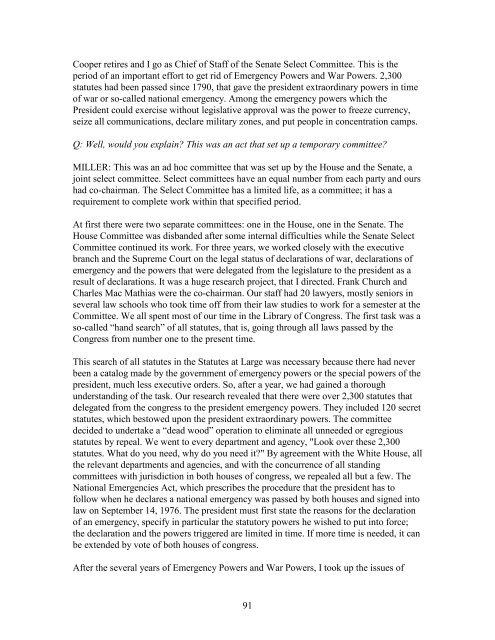1 The Association for Diplomatic Studies and Training Foreign ...
1 The Association for Diplomatic Studies and Training Foreign ...
1 The Association for Diplomatic Studies and Training Foreign ...
You also want an ePaper? Increase the reach of your titles
YUMPU automatically turns print PDFs into web optimized ePapers that Google loves.
Cooper retires <strong>and</strong> I go as Chief of Staff of the Senate Select Committee. This is the<br />
period of an important ef<strong>for</strong>t to get rid of Emergency Powers <strong>and</strong> War Powers. 2,300<br />
statutes had been passed since 1790, that gave the president extraordinary powers in time<br />
of war or so-called national emergency. Among the emergency powers which the<br />
President could exercise without legislative approval was the power to freeze currency,<br />
seize all communications, declare military zones, <strong>and</strong> put people in concentration camps.<br />
Q: Well, would you explain? This was an act that set up a temporary committee?<br />
MILLER: This was an ad hoc committee that was set up by the House <strong>and</strong> the Senate, a<br />
joint select committee. Select committees have an equal number from each party <strong>and</strong> ours<br />
had co-chairman. <strong>The</strong> Select Committee has a limited life, as a committee; it has a<br />
requirement to complete work within that specified period.<br />
At first there were two separate committees: one in the House, one in the Senate. <strong>The</strong><br />
House Committee was disb<strong>and</strong>ed after some internal difficulties while the Senate Select<br />
Committee continued its work. For three years, we worked closely with the executive<br />
branch <strong>and</strong> the Supreme Court on the legal status of declarations of war, declarations of<br />
emergency <strong>and</strong> the powers that were delegated from the legislature to the president as a<br />
result of declarations. It was a huge research project, that I directed. Frank Church <strong>and</strong><br />
Charles Mac Mathias were the co-chairman. Our staff had 20 lawyers, mostly seniors in<br />
several law schools who took time off from their law studies to work <strong>for</strong> a semester at the<br />
Committee. We all spent most of our time in the Library of Congress. <strong>The</strong> first task was a<br />
so-called “h<strong>and</strong> search” of all statutes, that is, going through all laws passed by the<br />
Congress from number one to the present time.<br />
This search of all statutes in the Statutes at Large was necessary because there had never<br />
been a catalog made by the government of emergency powers or the special powers of the<br />
president, much less executive orders. So, after a year, we had gained a thorough<br />
underst<strong>and</strong>ing of the task. Our research revealed that there were over 2,300 statutes that<br />
delegated from the congress to the president emergency powers. <strong>The</strong>y included 120 secret<br />
statutes, which bestowed upon the president extraordinary powers. <strong>The</strong> committee<br />
decided to undertake a “dead wood” operation to eliminate all unneeded or egregious<br />
statutes by repeal. We went to every department <strong>and</strong> agency, "Look over these 2,300<br />
statutes. What do you need, why do you need it?" By agreement with the White House, all<br />
the relevant departments <strong>and</strong> agencies, <strong>and</strong> with the concurrence of all st<strong>and</strong>ing<br />
committees with jurisdiction in both houses of congress, we repealed all but a few. <strong>The</strong><br />
National Emergencies Act, which prescribes the procedure that the president has to<br />
follow when he declares a national emergency was passed by both houses <strong>and</strong> signed into<br />
law on September 14, 1976. <strong>The</strong> president must first state the reasons <strong>for</strong> the declaration<br />
of an emergency, specify in particular the statutory powers he wished to put into <strong>for</strong>ce;<br />
the declaration <strong>and</strong> the powers triggered are limited in time. If more time is needed, it can<br />
be extended by vote of both houses of congress.<br />
After the several years of Emergency Powers <strong>and</strong> War Powers, I took up the issues of<br />
91
















